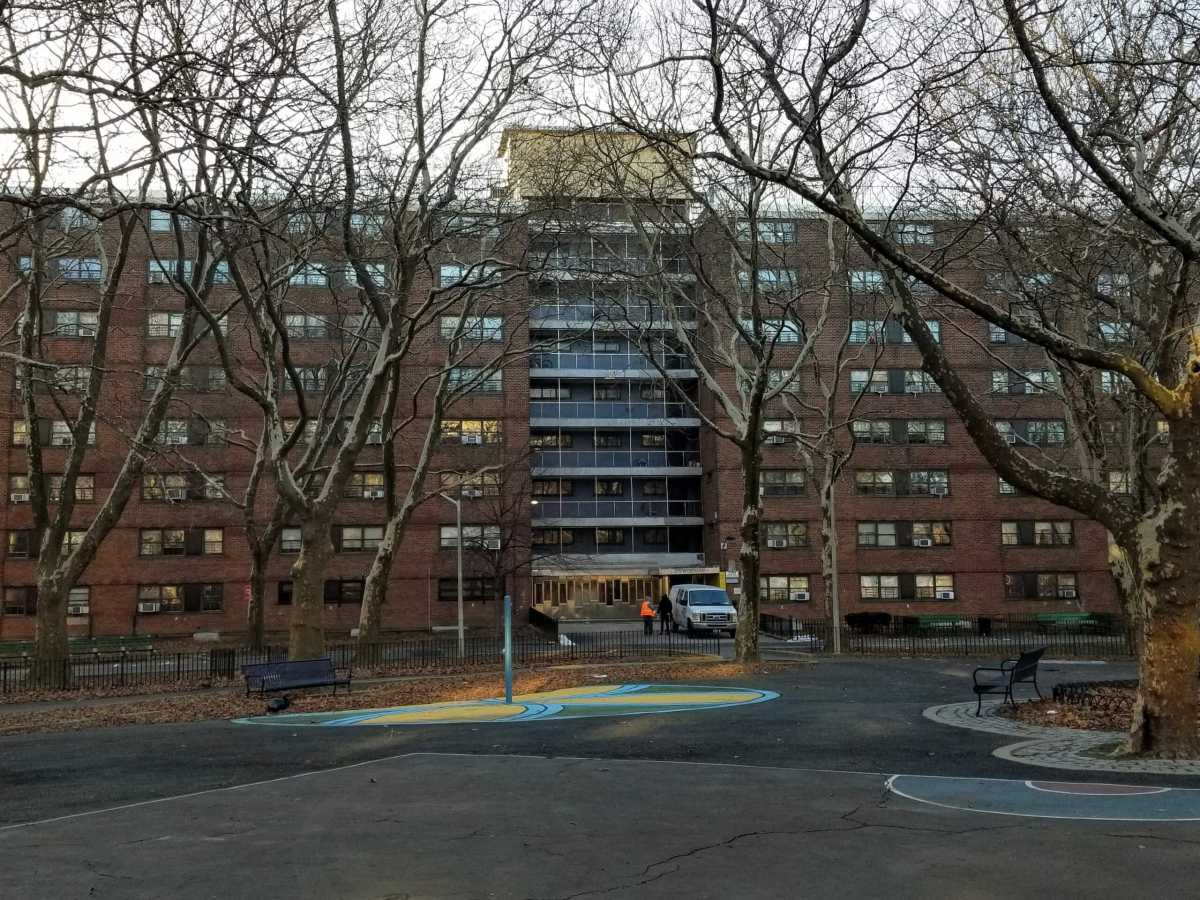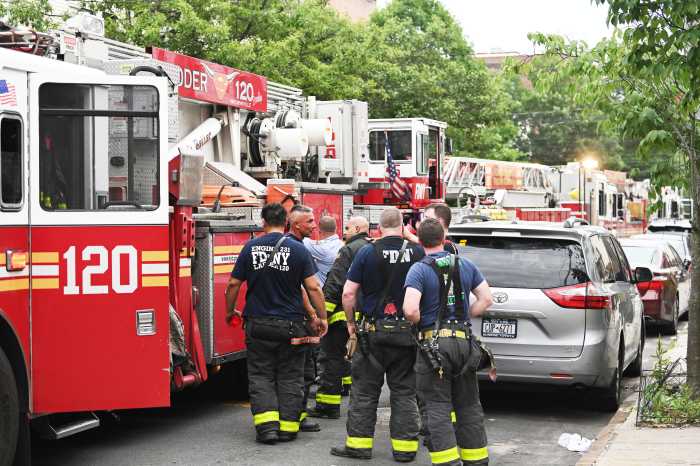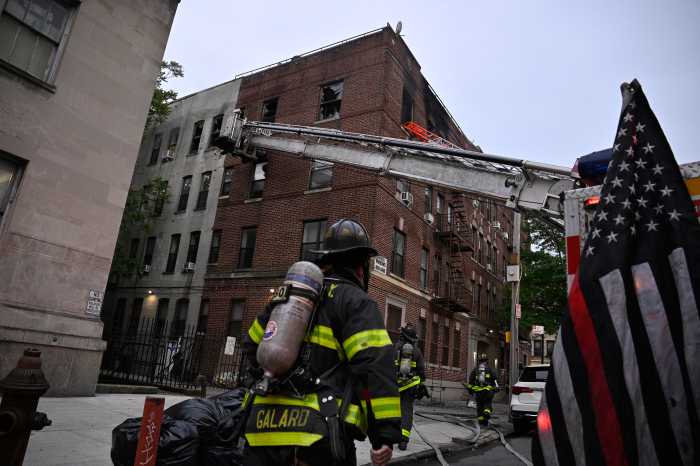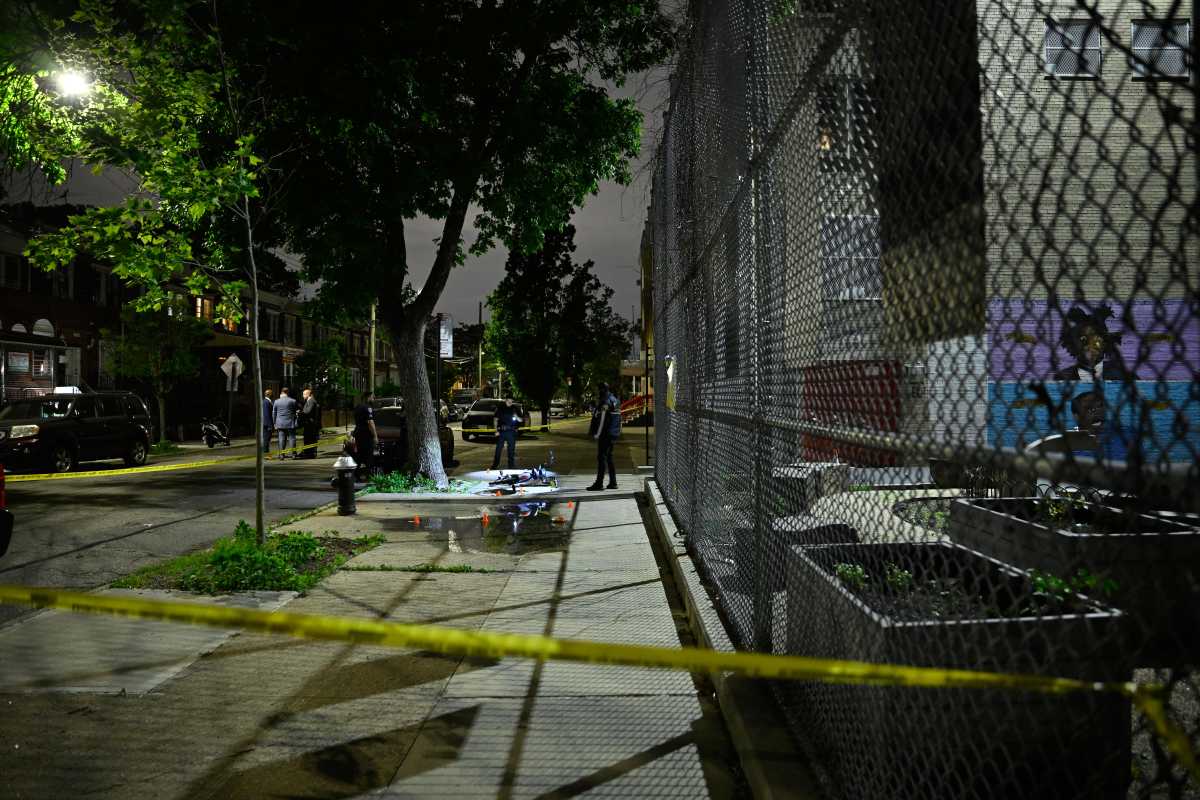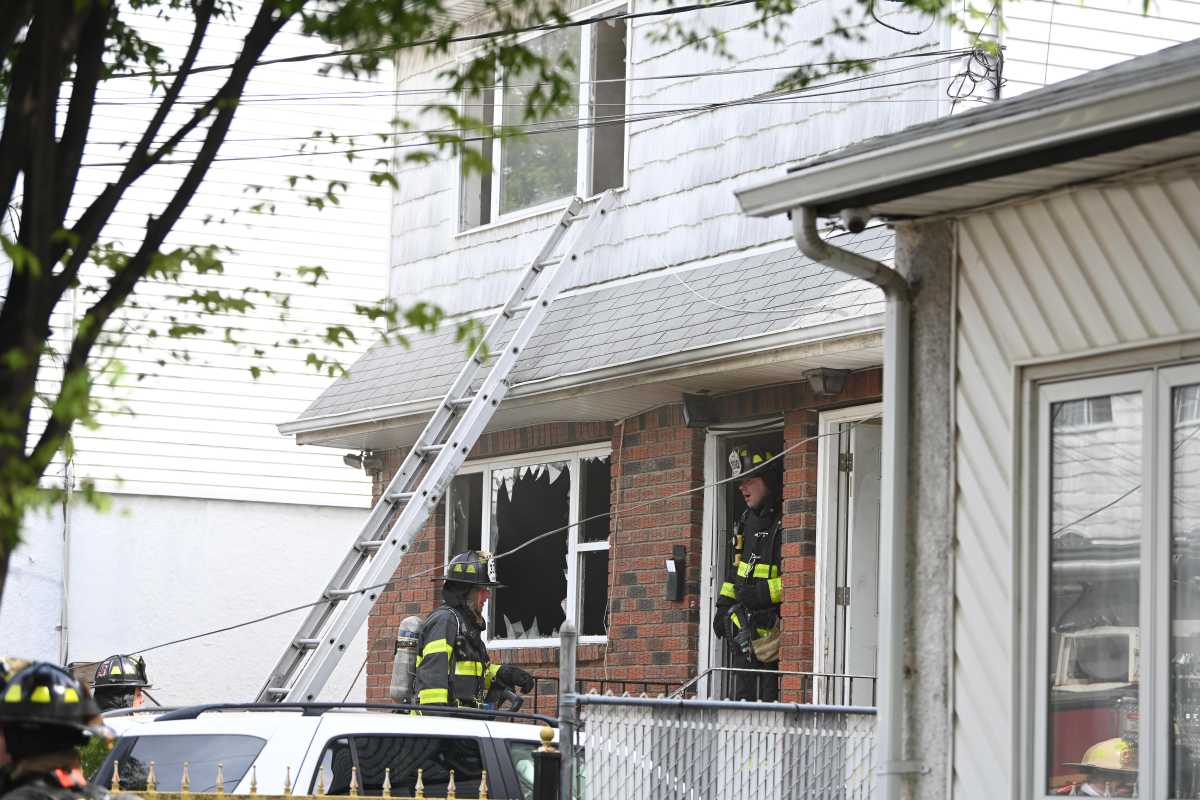The New York City Housing Authority converted several Brooklyn properties to private management late last year, but tenants say they have not yet gotten a reprieve from the myriad issues endemic to NYCHA, while also facing new problems often seen in privately managed buildings.
East New York’s Linden Houses is one of six Brooklyn properties that underwent Rental Assistance Demonstration (RAD) conversion last month, bringing in over $400 million for repair work there and at the neighboring Penn Wortman Houses, which together house nearly 2,000 apartments in 22 buildings.
Concurrently, as part of the feds’ RAD program, management at the Linden Houses was taken over by a consortium of developers, with C+C Apartment Management assuming duties at the sprawling complex.
“After numerous tenant meetings in coordination with NYCHA over the past year and assuming management responsibilities on December 29, we are working around the clock to ensure a smooth transition and provide our residents with the high-quality services they deserve,” said Marc Kaplan, chief operating officer of C+C, in a statement. “Engagement with residents is critical to any management change, and we look forward to continuing to develop a responsive, supportive working relationship with our residents as we begin comprehensive upgrades across the campus.”
NYCHA, with a $40 billion backlog of unmet capital needs at its deteriorating complexes, which house 350,000 New Yorkers, was, to put it lightly, a bad landlord.
The authority oversaw constant outages of heat, hot water, gas, electricity, and elevators, and allowed residents’ apartments to fall into dreadful states of decay in which residents must navigate a Kafkaesque bureaucracy in order to fix anything. Linden Houses alone has capital needs approaching $355 million, a NYCHA spokesperson said. As such, many residents were cautiously optimistic about the arrival of private management, postulating that the situation could not get any worse than it already was.
Now, two weeks after conversion, residents are still dealing with many of the old problems while also facing new issues previously unbeknownst to public housing tenants, but all too familiar to those living in private housing.
For one, the heat went out for hundreds of residents on the day that C+C took over, and many have not had heat in their apartments for two weeks during the coldest spell of the year, which has seen temperatures drop as low as 15 degrees Fahrenheit. Diane Ryan, who has lived at Linden Houses for 50 years, hasn’t had heat in her apartment for two weeks, making her dwelling uninhabitable and forcing her to stay with her sister.
“I had my [space] heater on and I had my stove going,” Ryan told Brooklyn Paper. “I’m at my sister’s, I can’t go back in there. It’s too cold. I’m 70-years-old, I can’t breathe like that, I can’t even bathe.”
The management company has visited Ryan’s apartment on several occasions, she said, but offered no answers on when she’d have her heat back.
“They came three times one day and didn’t do nothing,” Ryan said. “They came back a day later, they didn’t do nothing again. So I’m gonna stay over here with my sister until I get some heat. I cannot go in there.”
Ryan is far from the only tenant in her predicament: C+C gave out 150 space heaters to tenants dealing with heat outages in the past two weeks, according to Linden Houses resident association president Carol Barnes. Some are now anxious to use them after the deadly fire in the Bronx on Sunday, which killed 17 people and has been attributed to a malfunctioning space heater, likely in use because tenants were without heat.
Kaplan said that, as of Thursday morning, there are still about 20 outstanding heat complaints throughout the complex, though he noted that that number could be higher as some tenants may not file formal complaints. Kaplan said that management is working to address the issues, and noted that the heat outages are the fault of “insufficient and outdated equipment.”
“We pride ourselves in responsiveness and work to address heat issues as soon as we are made aware of them, which is especially important during colder months,” Kaplan said. “We are investigating the cause of the issues and will perform repairs and upgrades that address the heat and hot water systems so our residents can count on having these basic services that they’ve long deserved for many years to come.”
A spokesperson for NYCHA echoed that sentiment, arguing that RAD is in place specifically to fund and facilitate repairs to old equipment that causes frequent outages as currently seen.
Not-so-smooth transition
The lack of heat is only the beginning. Barnes, who has lived at Linden Houses since 1967, says she was shocked at the abruptness of the transition: NYCHA was gone and C+C was in place on Dec. 29, the same day that NYCHA publicly announced conversions to private management at Linden, Penn Wortman, Boulevard Houses, Fiorentino Plaza, Belmont-Sutter Houses, and Williamsburg Houses, totaling a $1.4 billion investment in over 5,200 apartments.
“They should’ve had a six-month transition before NYCHA officially pulled out,” Barnes said. “I was under the impression that they were working together, as they were getting everything together.”
Kaplan said that a management turnover of this scale was bound to come with growing pains, and encouraged residents to inform them of any issues that arise.
“[O]ur team is working to address all outstanding complaints that NYCHA received before December 29,” he said. “As with any management turnover at a residential complex – NYCHA or otherwise – residents are bound to notice a change. We encourage residents to let us know if there’s anything we can do to make sure that transition happens as smoothly as possible. We absolutely want to hear from our residents and intend to be very responsive to their concerns.”
NYCHA spokesperson Rochel Leah Goldblatt said that the authority and the new management company had been engaging with residents for the past two years and that the authority is working with stakeholders to address issues related to the transition.
“NYCHA has been engaging residents at Linden and Penn Wortman Houses for more than two years, sharing resources and hosting regular meetings to inform residents about the PACT program and prepare them for the transition to private management,” Goldblatt said. “NYCHA also worked with the PACT partners at Linden Houses for nearly two years leading up to the transition, conducting extensive diligence on the scope of rehabilitation work required and preparing the property for the transition of property management. Since the property converted to Project-Based Section 8 at the end of 2021, NYCHA has continued to work with the PACT Partners to ensure they are being responsive to emergent issues.”
Under RAD, a Department of Housing and Urban Development program developed under the Obama administration, decaying urban public housing stock is able to leverage public and private financing for repairs, often through “partner” companies, a condition made possible by conversion to Section 8. Developments typically convert to private management in the process.
Many residents at developments undergoing RAD fear the program is synonymous with privatization of public housing, but residents at Linden and other complexes have had their fears dissuaded when told that HUD would continue covering their rent beyond 30 percent of their income — even if private developers brought in raise rates — and that NYCHA will still own the property.
NYCHA’s continued ownership is key to why many thought the beleaguered housing authority would stay around, at least for a little while, to ensure a smooth transition. But that’s been anything but the case.
For instance, public housing residents are used to submitting “tickets” via the 707 hotline or the NYCHA app when they’re in need of repairs; the app allows real-time tracking of the ticket status, and provides some measure of accountability in the frequent event of problems going unaddressed. When the heat went out following conversion, frustrated residents phoning 707 were upset to hear NYCHA reps say it was no longer their problem.
“The day NYCHA left, the next morning people called the 707 hotline to say, ‘We have no heat.’ And NYCHA said, ‘We don’t deal with you anymore,'” Barnes said.
For the first few days, C+C had no system in place whatsoever to field complaints, she said, but as the heat outages dragged on, they pasted a phone number on residents’ doors to call for maintenance needs.
“When C+C first came in, the number they had set up that they gave us, it wasn’t even the correct number,” Barnes said. “So people are calling up that night for heat and they couldn’t even get through.”
After that fiasco, C+C pasted the correct number on residents’ doors, Barnes said. Kaplan, who said support staff are available to residents 24/7, forwarded a flyer to Brooklyn Paper which he said went out last week, containing two phone numbers, an email, and an office address and hours. Information was presented in English, Spanish, Haitian Creole, and Chinese, but Barnes said she’d never seen it before.
Further, under the new system, C+C does not create tickets to track project status, she said. Residents can also no longer check NYCHA’s online portal detailing all current outages of heat, hot water, electricity, gas, and elevators for work status in their development, as Linden is not managed by NYCHA anymore. Linden residents said elevators go out of service constantly, but they can no longer be monitored by the public in real time.
Tenants are even having trouble paying their rent: Barnes said that her January rent payment, which was made via direct deposit, was bounced back to her account; NYCHA said it no longer takes the payments. C+C, she said, has not set up a portal for tenants to make rent payments. “Even if we wanted to, we cannot pay the rent,” she said.
Kaplan acknowledged a “lag in our ability to accept rental payments while rent rolls are set up.” He said the consortium is working to provide rental assistance to Linden resident, and stated that no tenant will be penalized for missed rental payments
Goldblatt said that welcome packets had been sent out by NYCHA and C+C providing transition-related details, including how to submit work requests under the new system. “In the weeks leading up to the transition, NYCHA also delivered welcome packets to all residents with FAQs about the PACT program, including details and contact information about how residents can submit work order requests to their new management company,” she said.
Staffing issues
Nathaniel “Casper” Harold, a Linden resident, volunteer maintenance worker, and vice president of the resident association, said that while staffers are not being laid off, the project is still bleeding crew members. “They’re transferring to other developments,” Harold said.
“They have a choice to either stay or leave,” Barnes added. “And I guess depending on how many years you have with NYCHA, you’re not going to give up your pension and benefits.”
It’s unclear if the new management intends to maintain staffing manpower at pre-RAD levels, which Harold says is crucial at the massive complex, with its various design quirks and ancient machinery keeping the place afloat. Kaplan confirmed that NYCHA staff would be transferred to other complexes, and that new staff would be brought in.
There’s also confusion over the exact role of some of the companies involved in the RAD deal. The deal announced by NYCHA in December noted the housing authority’s “partners” for Linden and Penn Wortman would be a consortium led by Douglaston Development, L+M Development Partners, Dantes Partners, and SMJ Development. C+C is in charge of property management, while onsite social services are being provisioned by University Settlement, CAMBA, and Millennium Club.
Because NYCHA still owns the property, tenants are unclear about the role the consortium is actually playing, beyond those with clearly delineated roles like C+C as the management company. L+M, a major player in the city’s affordable housing industry, has been the most visible member company of the group, tenants say, but they could not differentiate their work from that of C+C.
Barnes speaks with C+C every day, but residents say recent meetings between tenants and the management company have not been particularly fruitful nor informative.
RAD’s history in New York
The 5,000 apartments converted in Brooklyn in December represent about a third of the NYCHA housing stock that has undergone RAD, the authority says; all told, RAD has brought about $3 billion of much-needed cash into the destitute housing authority. RAD shifts funding for public housing from Section 9, aka local housing authorities, to Section 8, aka rental vouchers. NYCHA continues to administer the Section 8 subsidy, set rents, manage waitlists, and “oversee the rehabilitation and conditions at the developments,” Goldblatt said.
NYCHA can step in when disputes between tenants and management arise, and requires partner companies to report on work orders and monitor response times to issues that need remediation like pests, mold, and heat outages, Goldblatt said. Barnes noted that NYCHA is supposed to meet with residents on a quarterly basis.
In New York, RAD was first implemented at the Ocean Bay Apartments in Far Rockaway, Queens in 2017. Residents there have generally had positive things to say about the repair regime fronted by the private manager, Wavecrest Management Group. City Limits found that Ocean Bay evicted more households than any NYCHA development between 2017 and 2019, but NYCHA told the New York Times earlier this year that the same number of households had been evicted in the four years since RAD conversion as in the four years before. Residents at the RAD-converted Baychester Houses in the Bronx have sung the praises of L+M, which is also the NYCHA partner there, as being more responsive and on top of repair needs, the Times found.
In that vein, other developments that underwent RAD last month are not facing the same problems as Linden. Clara Woods, president of the resident association at the Boulevard Houses, just blocks away from Linden, said she has had a good working relationship with Boulevard’s RAD partners, including new managers Property Resources Corporation and Lisa Management — especially when compared to the previous landlord.
“I don’t know what’s going on over there [at Linden],” Woods told Brooklyn Paper. “But I know that me and my board, we’ve been working with them since they came in and we’ve been getting things done. Over here in Boulevard, we have a good relationship with the ones we’re working with.”
Woods, who has lived at Boulevard for 50 years, says she’s in frequent contact with the new managers to ensure things are in ship-shape, and that she’s been impressed by the degree of respect they’ve given her, as the veritable expert of all things Boulevard.
“When they run into complicated things, they come to me, because I’ve lived here over 50 years — I know all the buildings and different things,” she said. “So when they run into complicated things, and they call me and they ask me about such-and-such, I can tell them. So it makes it easier for them to be able to connect up with certain things because they give me information, I give them information.”
RAD could still easily represent a sea change for Linden Houses residents, but for now, the troubles of living in NYCHA have far from receded; just on Wednesday, an elevator in one of the buildings was out for hours.
“This building is full of seniors and disabled people who are now stuck in the house,” Barnes said. “It’s just never-ending.”
Correction (Jan. 19, 6 pm): A previous version of this article incorrectly stated the source of funding for repairs under RAD. We regret the error.


